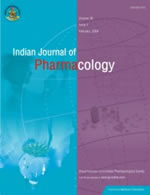
|
Indian Journal of Pharmacology
Medknow Publications on behalf of Indian Pharmacological Society
ISSN: 0253-7613 EISSN: 1998-3751
Vol. 39, Num. 5, 2007, pp. 217-217
|
Indian Journal of Pharmacology, Vol. 39, No. 5, September-October, 2007, pp. 217
Editorial
Irrational combinations: No consideration for patient safety
Prakash, Shiv
Chief Editor, Synchron Research Services Pvt. Ltd., The Chambers, 3rd Floor, Sarkhej-Gandhinagar Highway, Bodakdev, Ahmedabad - 380 054
Correspondence Address:Chief Editor, Synchron Research Services Pvt. Ltd., The Chambers, 3rd Floor, Sarkhej-Gandhinagar Highway, Bodakdev, Ahmedabad - 380 054
ijp@synchronresearch.com
Code Number: ph07055
Many articles have been written on the dangers of fixed dose combinations (FDC). The topic has been fiercely debated, because there is a need to weed out such combinations from Indian market for the safety of patients. But no pharmaceutical company has voluntarily stopped selling such combinations in India; on the contrary, they have continued to introduce more of such irrational combinations. We must welcome the initiation of action from DCGI's office. We needed somebody like Dr. Venkateshwarulu, the present DCGI, to take the bold step of issuing notices to withdraw those FDCs that have no therapeutic rationale and poor safety profile. He made an emotional appeal to the state drug authorities in the recently concluded Chennai meeting. From this one can get an idea of the reluctance of the state authorities to act on this deadly menace of FDCs in our country.
Most of the combinations which are marketed by companies are permitted by the state drug authorities, which is in clear violation of the law in the first place. The new combinations are termed 'new drugs' as per the Drugs and Cosmetics Act (Rule 122 (E)); they must, therefore, undergo clinical trials and safety studies to qualify for entering the market.
Recently, the Indian Drug Manufacturers' Association (IDMA) has decided against going to the courts, fearing an adverse ruling. This is a clear indication that many companies know that their combinations are useless-if not actually harmful-and have no scientific rationale behind it. An industry which boasts of great growth is not bothered about the safety of its own customers-the patients who consume those drugs. It is not just the pharmaceutical companies that are to be blamed for this irresponsibility and greed. We also need to see the other side of the coin-the doctors, who prescribe such combinations every day without questioning their rationale. Doctors need to play an important role in avoiding such irrational combinations, which have no clinical trial and safety data to justify their availability in the market and which may put patients′ lives in danger. Such combinations can be fatal at times (mint and coke produces a blast and death, which is a silly combination).
Pharmaceutical companies must behave in an ethical way in future and conduct detailed studies on such combinations. A pharmacokinetic drug interaction study is a must besides investigation of the safety profile. The DCGI office must put all the new combinations under a pharmacovigilance program for at least three years before giving them final marketing authorization. All the existing marketing authorizations must be cancelled at once and a surveillance program should be instituted. If the pharmaceutical company produces appropriate safety information by installing a good pharmacovigilance program for their product, then final marketing authorization must be issued. If there are any adverse events reported during this surveillance program, then the product must be withdrawn immediately, with appropriate patient compensation for the adverse events that occur.
Rational combinations can be of immense help to the health care program. These combinations may improve the quality of life for many. Such combinations (for example, antitubercular and antiretroviral combinations) are needed very urgently for many diseases.
I am sure some of the silly combinations will be off the shelf by the time I complete this editorial. Reworking on the above issues to provide the best combinations would restore the confidence in pharmaceutical companies, give assurance to regulatory people and, above all, make available better medicines for patients.
Copyright 2007 - Indian Journal of Pharmacology
|
